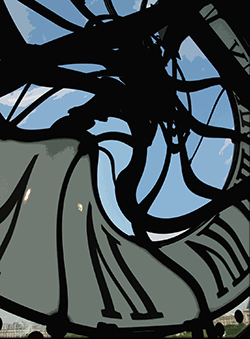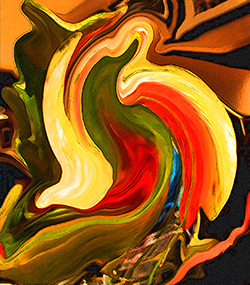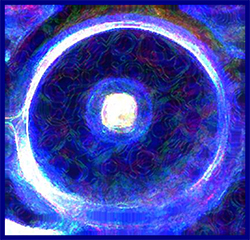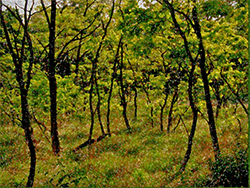
Power Release
Generating power in Taijiquan is a product of proper structure and release. Relaxing while maintaining alignment allows power to move smoothly.
The Second Lesson of Taijiquan
Fundamentally there are two lessons to learning Taijiquan skills. These two lessons involve many permutations, however each of the specific skills of listening, following, sticking, adhering, and releasing only develop through the consistent and deepening understanding of structure and relaxation.
The word in Chinese is Song or Sung, and it has a different connotation from what is colloquially thought of as relaxation in the west. To be Song means to be dynamically engaged. The musculature of the body is released from excess tension, thus optimizing the efficiency of movement.
Relaxing is Difficult
Interestingly, relaxation may seem to be an easy topic to understand, but it turns out that to relax in a dynamic way is quite challenging. Spring-like winding stores power. Unwinding releases it. Bearing in mind the martial nature of Taijiquan, it is important to understand how relaxation serves you in that capacity.
The stress of physical harm from another person precipitates the natural reaction of fight or flight. In the practice of Taijiquan you are retraining that reaction so you can remain centered and therefore be responsive rather than reactive. Reactions are out of your control. During the lapse of time between the initial shock and when the reactive impulse subsides, there is a loss of present awareness. Once that has passed, there is a further delay as you recover your bearings. The training of relaxation in Taijiquan allows you to remain present to the situation and respond accordingly.
When fear is the dominant emotion in a situation, you are less likely to be able to respond appropriately. In Taiji parlance, we say that the Qi has risen. You may experience the rising Qi as the feeling of weakness in your knees, the seizing of your lower back, a sense of panic, sudden onset tension, or a loss of balance. The ability to relax—even under stress—gives you your best ability to remain calm and respond consciously.
Relaxation is the Key to Being Present
In any situation being able to remain fully aware is one of the prevailing benefits to practicing Taijiquan. The doorway into understanding the full measure of Taijiquan's treasure is through the physical and the martial. Once in the door, the room reveals methods for activating your health and the pursuit of longevity.
Of course to live long, you must survive. However, longevity is about more than just living longer. It is also about giving more life to the years you live. Stress is increasingly one of the biggest health hazards of the times. Taijiquan is one of the practices that teaches ways of releasing stress. It does so by teaching you how to release unnecessary tensions first from your body and ultimately from your mind.
The principles of Taijiquan are relatively simple. Despite their simplicity, or perhaps because of it abiding by those principles is difficult. Your body is complex. Your mind even more so. The ability to register the subtle differences between being in principle or being even the slightest amount out of principle requires you to be incredibly sensitive and aware. Both the increase in sensitivity and awareness are benefits of the practice. It is said in Taijiquan that even if you are 99.99‰ correct, you are still 100‰ wrong.
Acquiring the Full Range of Skills
When properly executed Taijiquan skills appear to be effortless and powerful. Unlike most martial arts, which require speed and strength, Taijiquan is oriented toward having martial skills well into your senior years. Furthermore, since most people rarely engage in physical altercations, the actual use of fighting ability is rare. Living, on the other hand, facing the dangers and stresses of daily existence, the relationships and conflicts of civil society happen every day. Knowing how to relax in the face of conflict or tension is a profound benefit for being able to navigate the difficult waters of life. The real and most important skills of Taijiquan are the ones that help you every single day.
Better Relaxation Leads to Better Balance
Relaxation is key to conforming to the power of gravity. In fact, relaxation is the purview of gravity. Dynamic relaxation means doing only as much as is necessary to achieve your objectives. For instance, most people when holding an arm up are essentially holding twice the weight their arm. You can test this premise by taking your other arm and letting it hold the full weight of the first arm. You do this by relaxing and allowing the weight to sink into your supporting arm. You will feel how heavy the arm is. If you then slowly remove the support without allowing the arm to fall, it will continue to feel heavy and you will be barely holding its weight and therefore more relaxed.
When you relax the unnecessary tension from your body, your weight naturally sinks toward the center of the earth. Gravity functions on a direct radius to the earth's center, and so, no matter where you are on the planet, the line of gravity is always the same relative to you. When you are able to perform the first lesson of Taijiquan (structure) correctly, your body will be in a harmonious relationship with gravity. If you are leaning in any way, or if your body alignment is compromised, you will need to activate additional muscles to keep from falling.
Falling the Primary Fear
You are born with the fear of falling. It is not a learned trait. Unconsciously you will do whatever is necessary to keep from falling. By practicing Taijiquan, you will continuously refine your balance and alignment so that you can relax and use your energy efficiently to accomplish tasks as opposed to keeping yourself from falling. The better your alignment, the better your ability to relax. The better your ability to relax, the better your balance. The better your balance, the calmer your mind. The calmer your mind, the more capable you are of being fully yourself.





